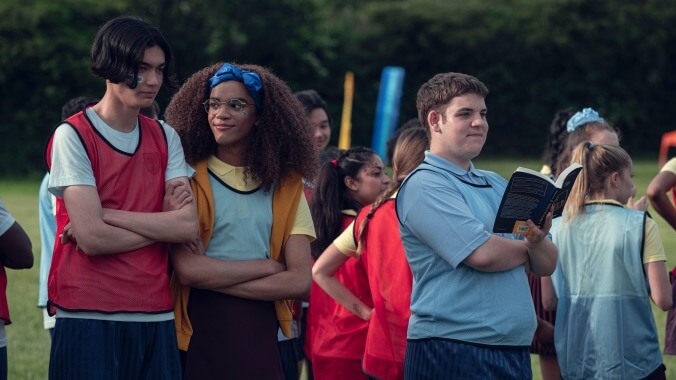Netflix’s Heartstopper is your next favorite wholesome, queer teen rom-com
This must-watch British coming-of-age series lives up to its title as well as its graphic-novel source material

It takes only two minutes into Heartstopper’s series premiere for high schooler Charlie Spring (Joe Locke) to lock eyes with his new deskmate, Nick Nelson (Kit Connor). The meet-cute takes place under soft sunlight glow, with pastel-colored animated leaves fluttering between them. They exchange sweet smiles, a “hi,” and bam, a crush is born, at least for Charlie. An openly gay teen, he’s recovering from being bullied after coming out the previous year, with no idea if seemingly straight rugby player Nick could ever reciprocate his feelings.
Heartstopper aces this portrayal of the bashful hope and gutting anxiety that accompanies young love. But the show isn’t just aimed at an adolescent crowd. After all, who hasn’t experienced extreme heart palpitations at age 15 while crossing paths with their crush? Charlie and Nick’s friendship-turned-romance is handled with jittery excitement and extreme care. Much like Alice Oseman’s graphic novel and webcomic, her TV adaptation is a proponent of tender LGBTQ romances and non-stereotypical characters in the midst of self-discovery.
Thankfully, Heartstopper subverts notions by keeping its protagonist proudly gay: It’s the love interest who has to sort through his unexpected feelings, not the other way around. Nick’s attraction to Charlie catches him by surprise (but not disdain). Over the course of the season, he begins to grasp and accept his bisexuality without any forced drama. Heartstopper is a comfortable antidote to the theatrics of, say, Euphoria or Élite. It can—and probably should—be watched as a family. The show owns its queerness, in turn helping viewers understand and embrace its many forms, with lots of charm to boot.
It also focuses on Charlie’s best buddies: Elle (Yasmin Finney), a Black trans student who moves away to an all-girls school to escape bullying, Isaac (Tobie Donovan), rarely seen without a book in hand, and Tao Xu (William Gao), a movie nerd struggling to keep the merry band together. Tao is also protective of Charlie, sometimes to a grating degree, once he joins the rugby team to remain closer to Nick. The group ends up bonding with Elle’s new friends, Tara Jones (Corinna Brown) and Darcy Olsson (Kizzy Edgell), who gradually begin to flaunt their own relationship. Tara and Darcy’s journey provides an interesting parallel to Charlie and Nick, who start off more on a note of confusion. Thankfully, the show paces them getting together with believable momentum.
Heartstopper doesn’t shy from letting Nick and Charlie explore their budding affection for one another. Again, it’s no Euphoria with expletives and nudity, or even Sex Education, even though both British shows share a similar warmth. Instead, there is a thrill of holding hands for the first time (denoted through more animated sparks) or sneaking kisses in private. None of it comes off as amateurish. It’s just wholesome and electrifying in a grounded way—and mostly devoid of any peer pressure. They still attend a boy’s high school with the average set of tyrants—in this case, it’s largely Nick’s rugby friends who pick on Charlie and Tao the most. But fret not: Nick is actually a pure-hearted teen who manages to step out of their shadows.
The show’s casting hits all the right notes, in part because the actors are actual teens and not in their mid-twenties. Finney, Brown, and Edgell deliver subtle and impactful performances. British royalty Olivia Colman (sorry, that’s just her official designation now) cameos as Nick’s supportive mother. Locke, a newcomer, makes a worthwhile debut; as an actor, he’s equal parts self-assured and vulnerable, which automatically lends those same qualities to Charlie. Connor brings an intense affability to Nick, and it’s impossible not to root for him right away.
Locke and Connor share an incredibly cute on-screen chemistry that sells the show. Their dynamic radiates off the screen, never more so than in the finale, which is called “Boyfriend” but might as well be titled “Happy Tears.” Fair warning: The final 15 minutes are glorious and may actually stop your heart. Oseman’s work is undeniably sharp and “aww”-inducing, and it might be a challenge not to watch all eight episodes in one sitting. Luckily, though, the four hours will be time well spent.